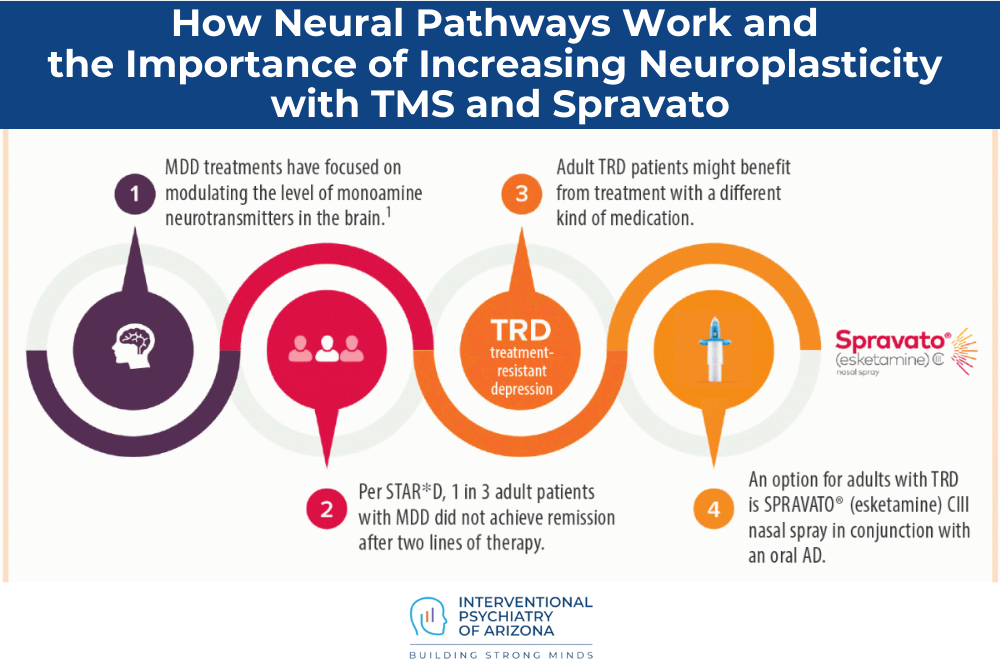 The human brain is an intricate and dynamic organ, constantly evolving in response to experiences, thoughts, and emotions. At the core of this adaptability lies neuroplasticity, the brain’s ability to reorganize and form new neural connections. Understanding how neural pathways work can help us appreciate the effectiveness of treatments like Transcranial Magnetic Stimulation (TMS) and Spravato (esketamine), both of which are designed to enhance neuroplasticity and improve mental health conditions.
The human brain is an intricate and dynamic organ, constantly evolving in response to experiences, thoughts, and emotions. At the core of this adaptability lies neuroplasticity, the brain’s ability to reorganize and form new neural connections. Understanding how neural pathways work can help us appreciate the effectiveness of treatments like Transcranial Magnetic Stimulation (TMS) and Spravato (esketamine), both of which are designed to enhance neuroplasticity and improve mental health conditions.
Understanding Neural Pathways and Neuroplasticity
Neural pathways are the connections between different neurons in the brain that facilitate communication and processing of information. These pathways are responsible for everything from sensory perception to emotions and decision-making. Over time, neural pathways can strengthen or weaken based on repeated experiences and behaviors.
Neuroplasticity refers to the brain’s ability to adapt and change by forming new neural pathways. This ability allows us to learn new skills, recover from injuries, and adapt to new situations. However, conditions such as depression, anxiety, and PTSD can impair neuroplasticity, leading to rigid thought patterns and emotional distress.
Why Increasing Neuroplasticity is Important
When neuroplasticity is enhanced, the brain becomes more adaptable and resilient. This is especially important for individuals suffering from mental health conditions, as increasing neuroplasticity can help break negative thought loops and foster positive changes in mood and behavior. Enhancing neuroplasticity can improve:
- Mood regulation: Reduces symptoms of depression and anxiety.
- Cognitive flexibility: Encourages more adaptive thinking and problem-solving.
- Emotional resilience: Helps individuals manage stress and trauma more effectively.
- Memory and learning: Supports the ability to retain and apply new information.
How TMS and Spravato Enhance Neuroplasticity
Transcranial Magnetic Stimulation (TMS)
TMS is a non-invasive treatment that uses magnetic pulses to stimulate specific areas of the brain associated with mood regulation. By targeting the prefrontal cortex, TMS encourages neural activity in areas that may be underactive in individuals with depression and anxiety. Through repeated stimulation, TMS promotes neuroplasticity by reinforcing healthy neural pathways and improving communication between different brain regions.
Spravato (Esketamine)
Spravato is an FDA-approved nasal spray that contains esketamine, a form of ketamine used to treat treatment-resistant depression. Unlike traditional antidepressants, which take weeks to show effects, Spravato works rapidly by increasing glutamate levels, a neurotransmitter essential for neural communication and plasticity. By enhancing synaptic connections in the brain, Spravato helps individuals experiencing severe depression regain emotional balance and cognitive clarity.
Comprehensive Q&A Section
Q: How long does it take for TMS to show results?
A: Many patients begin to notice improvements within 2-4 weeks of starting TMS therapy. However, the full benefits often become apparent after completing the recommended 4-6 week treatment course.
Q: Is TMS safe?
A: Yes, TMS is FDA-approved and considered a safe treatment for depression, anxiety, and other mental health conditions. It is non-invasive and does not require anesthesia.
Q: How does Spravato differ from traditional antidepressants?
A: Unlike SSRIs and other antidepressants that primarily target serotonin levels, Spravato works on the glutamate system, rapidly improving mood and neuroplasticity. This makes it an effective option for individuals who have not responded to traditional treatments.
Q: Can I combine TMS and Spravato for better results?
A: Yes, in many cases, combining TMS and Spravato can provide enhanced benefits by simultaneously stimulating brain activity and increasing neuroplasticity.
Q: Are there any side effects of TMS or Spravato?
A: TMS may cause mild headaches or scalp discomfort, while Spravato can lead to temporary dizziness, nausea, or dissociation. However, both treatments are well-tolerated by most patients.
Q: How do I know if I am a candidate for these treatments?
A: If you have not responded well to traditional antidepressants or therapy, you may be a good candidate for TMS or Spravato. A consultation with our specialists can determine the best approach for you.
Contact Interventional Psychiatry of Arizona
If you or a loved one are struggling with depression, anxiety, or other mental health conditions, Interventional Psychiatry of Arizona can help. Our team specializes in cutting-edge treatments that enhance neuroplasticity and promote long-term mental wellness.
Interventional Psychiatry of Arizona
📍 Address: 2122 E. Highland Avenue, Suite 335, Phoenix, AZ 85016
📞 Phone: (602) 824-8404
🌐 Website: interpsychaz.com
Take the first step towards healing today by scheduling a consultation with our expert team.
